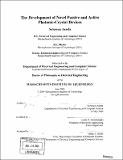The development of novel passive and active photonic-crystal devices
Author(s)
Assefa, Solomon, 1979-
DownloadFull printable version (23.28Mb)
Other Contributors
Massachusetts Institute of Technology. Dept. of Electrical Engineering and Computer Science.
Advisor
Leslie A. Kolodziejski.
Terms of use
Metadata
Show full item recordAbstract
Photonic crystals are anticipated to have impact on large-scale photonic integrated circuits by allowing the creation of compact and efficient devices such as waveguides, splitters, microcavity filters, light emitting diodes, and lasers. Previous experimental research has mainly focused on photonic crystals composed of a lattice of air holes etched into dielectric slabs. This thesis discusses the design, fabrication, and characterization of the "inverse" structure, a square lattice of dielectric-rods in air. Bandgap guiding of 1.5 lam light is experimentally demonstrated for a photonic-crystal waveguide created by introducing a line-defect of smaller-radii rods. To provide efficient optical coupling between input/output dielectric waveguides and the photonic-crystal waveguide, an adiabatic taper having two stages is employed. Furthermore, the thesis investigates novel photonic-crystal devices and fabrication schemes. An expose-develop-etch (EDE) method is utilized to fabricate rod-based photonic-crystal devices in III-V and SOI material systems. The thesis also presents an electrically-activated linear-waveguide photonic-crystal laser. A compact microcavity is created by introducing a defect inside a one-dimensional photonic crystal. Electrical-activation and edge-emission are achieved by patterning microcavity waveguides into p-i-n-doped epitaxial heterostructures. The compact photonic-crystal laser is anticipated to have impact on the integration of optical devices on the same chip.
Description
Thesis (Ph. D.)--Massachusetts Institute of Technology, Dept. of Electrical Engineering and Computer Science, 2004. Includes bibliographical references (p. 158-169).
Date issued
2004Department
Massachusetts Institute of Technology. Department of Electrical Engineering and Computer SciencePublisher
Massachusetts Institute of Technology
Keywords
Electrical Engineering and Computer Science.